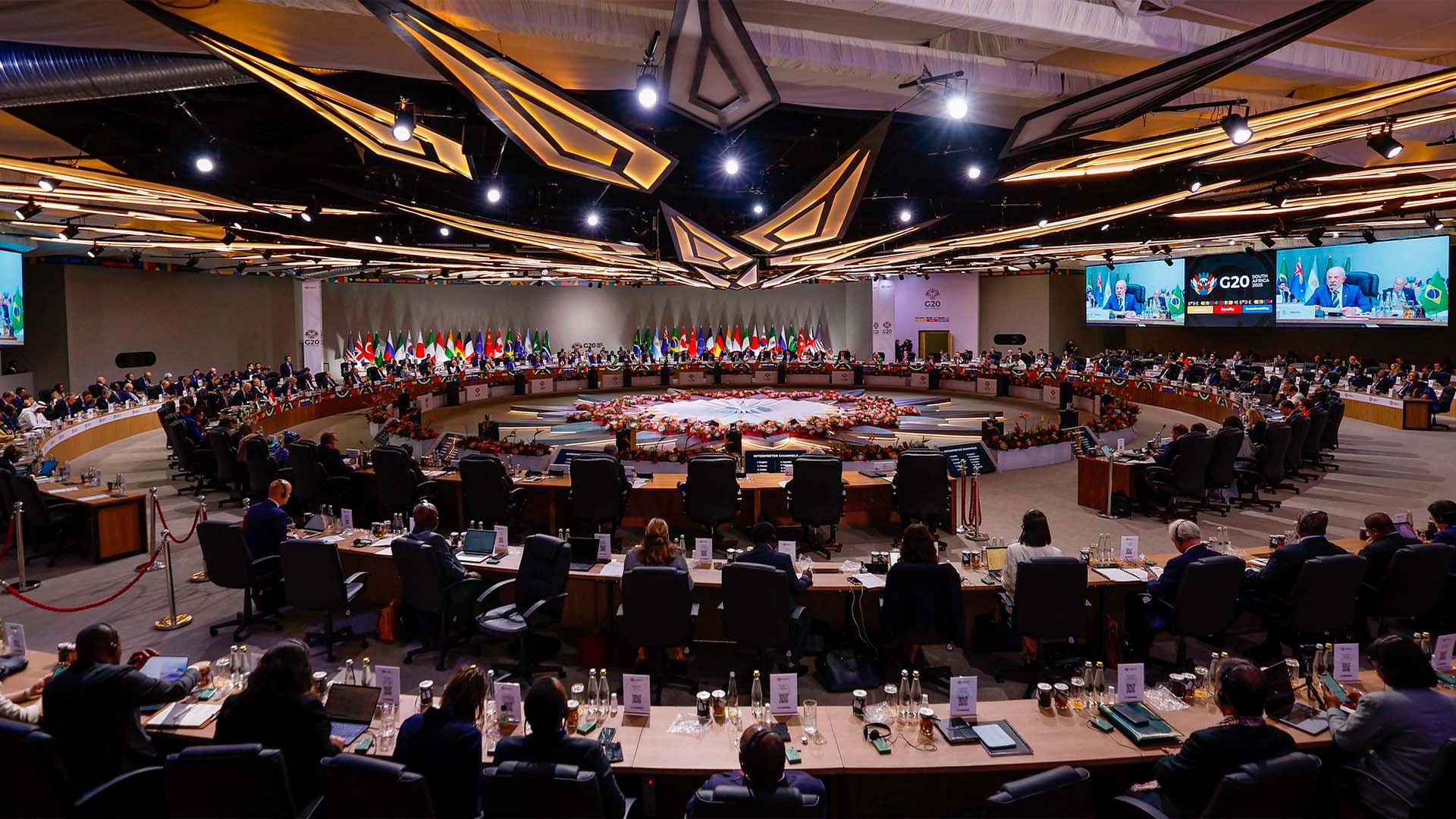The 2025 G20 Summit in Johannesburg marks a turning point in the history of global economic governance. For the first time since the forum’s inaugural meeting of leaders in 2008, the US not only failed to shape the agenda but chose to boycott the entire process. President Donald Trump refused to attend, justifying his absence with the fabricated claim that ‘Afrikaners are being killed’ in South Africa, and attempted to downgrade the summit by insisting that the host country hold a handover ceremony with a junior US diplomat. President Cyril Ramaphosa –encouraged by the other members of the G20– declined to bow to US pressure. Rather than yielding, he even ‘dared’ to issue a G20 Leaders’ Declaration without the consent of the White House. Was this an unprecedented move towards a world ‘after hegemony’, as Robert Keohane would have it?
The Johannesburg G20 Summit offers a fragile and preliminary glimpse of what global governance might look like without US leadership. The world has not entered a full ‘after hegemony’ system, but it has experienced its first mini rehearsal.
Of course, this moment does not signal the arrival of a new world order. Far from it. But it does show –tentatively, imperfectly, symbolically– that multilateralism can survive without the US. The G20 produced a final declaration, climate commitments were restated and major economies coordinated their diplomatic positions. These are not trivial achievements. They hint at a world that is beginning to function ‘after hegemony’: a world in which cooperation persists because states, and their civil societies, see value in collective action, not because a hegemon orchestrates the process. This has been palpable in the Think Tank 20 (T20) discussions I have attended over recent years, where the US has been increasingly noticeable by its absence.
Yet this is only the beginning. The outcome of the Johannesburg summit raises more questions than answers about what a post-hegemonic multilateral system might look like.
The US boycott
The political context of the US boycott set the tone for this G20 summit. And this was clearly observable in my conversations at the T20. South African officials and think tankers, as well as many other African voices, interpreted Trump’s absence as an insult to the host and the continent. His emphasis on a fabricated narrative about the killing of Afrikaners added racial and ideological undertones. More broadly, the boycott exemplifies the broader transformation of the US from a stabilising presence in global governance to a more unpredictable, selective and at times openly confrontational actor.
The shift was reinforced by the timing of the US 28-point plan to end the war in Ukraine, released a few hours before the G20 Summit, despite Washington’s absence. The plan was widely perceived by European capitals as skewed in favour of Russia, offering concessions that undermined core principles of Ukraine’s sovereignty. What troubled European delegations most was not only the content but the method: the US sought to impose a peace framework unilaterally, without consultation, and by not even being present in the most important multilateral gathering.
This combination of boycott and unilateralism constitutes a clear break with the historical role the US once played. Instead of providing the leadership that sustains cooperation, Washington now acts openly as a ‘predatory’ hegemon, using its power to shape outcomes in its interest while disregarding institutional processes and, most importantly, the reaction that these measures might trigger, even among its closest allies. The implications for the G20 are existential. Can it survive without the engagement of the US?
Europe and the Plural South
One of the central dynamics at Johannesburg was the emerging –albeit fragile and situational– convergence between Europe and parts of the Global South. This is not a new political axis, nor a coherent coalition, nor a unified worldview. It is a provisional alignment born of necessity, driven by a shared interest in preventing the G20 from collapsing into irrelevance.
For Europe, the stakes are existential too. This is why the Europeans were reportedly among the forefront of those who were in favour of issuing the G20 leaders’ declaration. Not issuing a final declaration simply because the US objected to it would mean ‘ceding sovereignty to Washington’ at a crucial moment when Europe’s security is at stake. In this regard, it was significant that European countries –together with Japan and Canada– took an even bolder stand in Johannesburg when they collectively resisted the US-Russian proposal on Ukraine, calling for ‘additional work’ and refusing to endorse a process that circumvented multilateral norms altogether.
For the Global South (which would be better termed the Plural South, given that it is not a coherent bloc but rather dozens of countries with their idiosyncrasies and interests), the priority here is to increase its influence on world affairs. South Africa, Brazil, India and Indonesia share an interest in demonstrating that the G20 cannot be held hostage by US political cycles or used as an instrument in the rivalry between great powers. Ramaphosa’s decision to issue a full summit declaration, despite US complaints, was a deliberate affirmation that emerging powers can act as responsible stewards overseeing global processes.
This Europe-Global South convergence is thus better understood as a coalition of the willing for institutional continuity. It is not ideological, and it is not directed against the US per se. It stems from the recognition that in a fragmented world, the cost of letting institutions fail is higher for everyone, including for the US, even though Trump, and some of his aides, might not be able to see it.
Symbolic multilateralism
Although it might be characterised as a list of good intentions unlikely to be fulfilled, the Johannesburg G20 declaration carries real symbolic weight. Climate change is mentioned 13 times, sustainability 66, equality 44 and gender five. These numbers matter politically. They signal priorities that a broad range of countries –from Europe, Africa, Asia and Latin America (this is the case for Brazil at least, not so for Argentina)– are willing to articulate collectively, even when the US chooses not to participate.
But symbolism is not substance. It is true that the declaration is ultimately a catalogue of aspirations rather than a roadmap of action. The G20 has rarely produced binding commitments, and without the US, the gap between rhetoric and implementation grows even larger. The success or failure of multilateral cooperation cannot be measured by the number of times climate appears in a communiqué, but by whether emissions fall, financial flows change and development goals are met.
In this regard, the 2025 summit reveals the possibility, not yet the reality, of multilateralism after hegemony. The system has proved resilient enough to operate in the absence of the US but is not yet effective enough to deliver collective outcomes.
The EU’s strategic role
If the US retreats from multilateral leadership and China remains unwilling to assume that role, the EU becomes the only major actor with both the normative identity and institutional commitment to defend the principles of the liberal order. But doing so requires a strategic shift.
First, the EU must understand that the Global South is a Plural South, diverse in interests, political systems and strategic cultures. Engagement must therefore be bilateral, respectful and devoid of moral superiority. A single EU narrative will not resonate in Brasília, Jakarta, Riyadh or Pretoria. Tailored partnerships are essential.
Secondly, the EU should not fear that by deepening cooperation with the Plural South it is betraying Washington. The US itself is moving outside multilateral structures and attempting to shape outcomes extraneously. Preserving global governance is not disloyalty; it is strategic autonomy through diplomatic action.
Thirdly, Europe must recognise that neither the US nor China will lead the new multilateralism ‘after hegemony’. They are the two superpowers, and they think multilateralism constrains more than it facilitates their power. This is why the EU needs to work with its partners from both the plural north and south in the creation of a new multilateralism.
Finally, today it is the EU –not Trump’s America– that most consistently defends the core values of openness, rules-based cooperation, democracy and human rights. This is not Eurocentrism. It is a reflection of geopolitical reality. If these values are to remain part of the international system, it will fall to Europeans and their partners in the Plural North and South to uphold them.
Next stop: Miami
The Johannesburg G20 Summit offers a fragile and preliminary glimpse of what global governance might look like without US leadership. The world has not entered a full ‘after hegemony’ system, but it has experienced its first mini rehearsal. Cooperation proved possible, a declaration was adopted and Europe and the Global South collaborated pragmatically.
But the limits are clear. Symbolism cannot replace implementation. The absence of the US creates political space but also institutional weakness. Whether this emerging multilateralism can deliver real results –on climate, development or macroeconomic and financial stability– remains an open question.
The South African presidency of the G20 marks the end of a cycle. All the countries that belong to this club have now hosted the forum. It is thus rather unfortunate that the US boycotted this last summit, and more worrying still is the fact that the 2026 G20 meeting in Miami risks becoming an exercise in presidential showmanship, with Trump planning a summit calibrated around personal prestige, bling and political theatrics rather than collective problem-solving.
After all this bling, perhaps in 2027 the EU should consider hosting the G20 for the first time. If there is a world capital where multilateralism can be saved it is surely Brussels.


